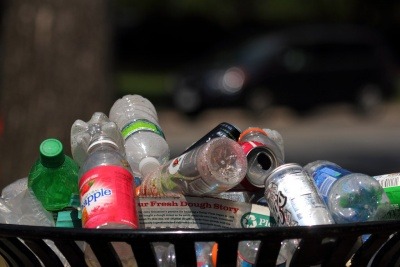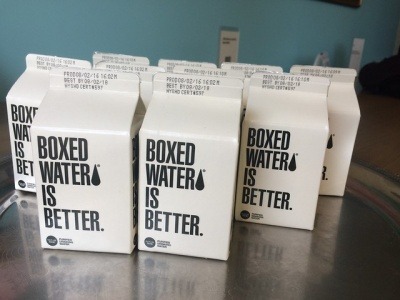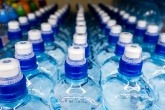Single-use drinks containers: Plastic alternatives still harmful

In this unrelenting summer heat, staying hydrated while out and about is crucial, but many people are thinking twice before purchasing a plastic bottle of water; the backlash against single-use plastics remains in full swing. And spurred on by this public demand for change, more and more companies are now offering up alternatives to disposable plastic water bottles: you can now buy water in aluminium cans, cardboard cartons and glass bottles.
On the surface, these alternative products might seem like a good idea, helping us to cut down on our plastic consumption. But as a new report from environmental think tank Green Alliance points out, these new drinks containers are still single-use products, just like the plastic bottles they are meant to be replacing. And all materials have environmental impacts at every stage of their lifecycle. ‘We should be careful not to create new problems for our environment by using other materials in huge quantities,’ the report states.
Comparing environmental impacts – plastic is not the only offender
Titled ‘Losing the bottle: Why we don’t need single-use containers for water’, Green Alliance’s publication sets out the potential environmental impact of different single-use container materials. While plastic bottles are undoubtedly the worst in terms of their end of life impact, with 700,000 bottles littered every day, aluminium cans are infinitely recyclable, meaning the material has the potential to be reused again and again.
Canned water company CanO Water states that the average aluminium can is made from 68 per cent recycled content, adding that if its cans are recycled they will be back on the shelves’ as new cans in ‘as little as six weeks’.
However, we are not yet at a point where new cans are made from 100 per cent recycled material, and Green Alliance points out that a growing market for aluminium cans would stretch the availability of recycled aluminium and require more raw material to be mined. The report states that aluminium cans have a more negative impact that plastic bottles when it comes to production, suggesting that if half of the UK’s plastic water bottles were switched to cans, over 160,000 tonnes of toxic waste could be produced from the process of mining the aluminium required – enough to fill the Royal Albert Hall six times over. This ‘toxic waste’ is bauxite tailings or ‘red mud’, a hazardous alkaline material produced from the refining of bauxite ore into aluminium.
Looking at glass, the report states that this material produces higher carbon emissions than plastic, aluminium or cartons. If half the UK’s water bottles were switched to glass, this could generate 1.42 million tonnes of CO2 equivalent from production and transport, the same as the average yearly emissions of almost 95,000 people.

In addition, alternatives to plastic water bottles are still just as likely as plastic to be littered or be thrown in residual waste rather than recycling. But companies are increasingly making changes to the materials they use in response to public nati-plastic pressure, often without thinking about the overall lifecycle impact of the new material.
Commenting on the report, Colin Church, chair of the Circular Economy Task Force and chief executive of the Institute of Materials, Minerals and Mining, said: “Plastic pollution is a real environmental problem, but simply moving on to making single use items out of other materials isn’t always the right solution because they too will have drawbacks.”
Single-use solution
Solutions proposed by government, such as a deposit return scheme (DRS) for drinks containers, could make a dent in the amount of litter on the streets – Zero Waste Scotland has suggested that a DRS in Scotland could result in a 90 per cent reduction in litter.
However, while cleaning up the streets is important, it doesn’t tackle the other environmental impacts of drinks containers, from production waste to carbon emissions.
The good news is that the simplest, cheapest and most environmentally-friendly solution is staring us in the face: tap water. Taking a reusable bottle with you wherever you go, and filling it up with tap water where you can, Green Alliance says, is the only low impact option when it comes to drinking water. While companies scramble to find new ways to package shop-bought water, if we all bought fully into the idea of refillable bottles, the problems caused by single-use drinks containers could be greatly diminished overnight.
Libby Peake, senior policy adviser on resources at Green Alliance, said: “‘Single-use’ was named word of the year in 2018 as the public became more aware of the impacts of our throwaway society. But so far, people are mainly targeting single-use plastic and the concern hasn’t translated to other materials, which also have environmental consequences.
“If we don’t need single-use plastic water bottles, we also don’t need single-use cans, cartons, or glass bottles for water. The good news is, it’s easy to do the right thing when it comes to drinking water and the environment. Tap water in refillable containers is the most sustainable option, and is hundreds of times cheaper to boot.”
Church added: “The problem of single use water bottles is a powerful example of why we should aim to cut the amount of materials used in the first place. We need to reuse and refill more while thinking carefully about whether it is wise to switch to different materials.”
It seems simple – but the UK still has an addiction to disposable, on-the-go products. In 2017, for instance, UK consumers used 13 billion plastic bottles. In order to crack this addiction, it needs to be even easier to access tap water out of the house.
The Refill movement
Refill, set up by Bristol-based charity City to Sea, is working hard to improve access to free water and there are now more than 20,000 ‘refill stations’ – businesses that promote themselves as offering free tap water to passersby – set up across the UK. In July, London Mayor Sadiq Khan announced 100 new water fountains would be installed across the capital, while the Welsh Government has said it aims to become the world’s first ‘Refill Nation’.
Natalie Fee, founder of City to Sea, commented: “We live on a finite planet – we simply don’t have enough resources to keep fuelling our throwaway culture. Whether it’s plastic, aluminium or other materials, the extraction, manufacturing, transportation and recycling processes can come with a high environmental cost.
“The shift the planet needs and the public wants is away from disposability towards a culture of reusability. When it comes to drinking water on the go, refilling from taps and fountains is convenient and saves resources and money – what’s not to love about that?”
The full report, ‘Losing the bottle: Why we don’t need single-use containers for water’, can be read on the Green Alliance website.







